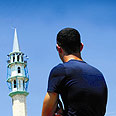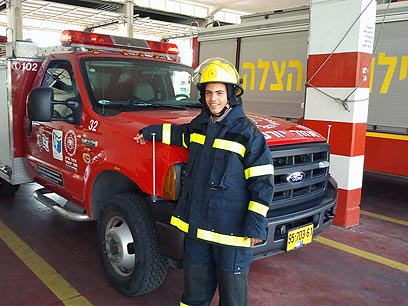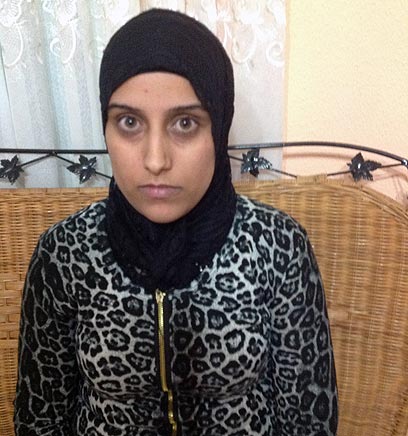
The national service debate
Special: Arabs who chose to perform national service speak about decision, as debate continues
"A law that would force Arab youth to volunteer for national service would be a mistake. People can't be forced to volunteer," say many in the Arab sector.
Some feel that if a bill making military or national service compulsory for all citizens passes, Arab opposition to national service will only grow. However, the broad-based opposition to national service expressed by Arab MKs has also come under criticism.
Related stories:
- Op-ed: Don't force them to serve Ministers approve 'enlistment for all' bills
- Tal Law: Should yeshiva students be forced to enlist?
- Op-ed: Arabs need new leaders
On Monday, the Tal Law Committee met for the first time, but without the Arab representative who is expected to join. Prime Minister Benjamin Netanyahu took part in the meeting and said that its guiding principles needed to be "sharing the burden and gradual implementation that includes both Jews and Arabs, without setting one population against another."
In recent years, the number of Arabs volunteering for national service has grown. The Science Ministry, which oversees the program, explains that "every year, Bedouin, Druze, Muslims, Christians, and Cercassians take part in national service all over Israel, mostly in Arab communities."

Hazzam Amara - proud to save lives (Photo: HNN)
According to the ministry, they volunteer in the welfare, health, and education fields. However, some face threats as a result of their service.
Currently, some 2,400 Arabs ages 18-24 are volunteering for national service, 15% of whom are on their second year. Fifteen percent serve in Arab communities, while the rest perform service among the general population. Ninety percent of the volunteers are female, the ministry says.

Rona Hajajra: We help people the Arab MKs don't
Naal Zoabi, principal of the elementary school in Tamra, encourages national service. "From a moral point of view, we as citizens have to make an effort to integrate into society. National service is important for us. It's easier to achieve (things) when we make a contribution to the state and to the community."
According to Zoabi, there is great educational significance in the fact that a citizen can fulfill him or herself by taking responsibility and giving to the community. "It's time that Israeli Arabs act in their own interest, because they're part of the state of Israel. We don't have any other country. I'm sorry that part of the leadership is trying to profit off the subject of giving to others."
"It's time to show maturity and stop keeping the sector indentured because of personal and political interests," Zoabi said.
Dallal Abada, a resident of the Jezreel Valley, has been a national service coordinator for two years. "It's going well and there's a large demand," she says, despite the relatively modest numbers. "We currently have 125 volunteers from all the Arab villages in the North, and 70 young people have already signed up for next year – but this number will grow."

MK Ahmad Tibi: We won't be the victims in a 'secular-haredi war' (Photo: Gil Yohanan)
Abada adds: "Many people opposed national service, but they understood what it was they changed their mind and encouraged us. They just got incorrect information about our project. Our volunteers work in universities, in Magen David Adom and in all the hospitals in Nazareth."
Nevertheless, Abada does not support the bill that would force Arabs to serve. "I prefer national service to remain a choice… If the law passes, the opposition will grow. Personally, I believe in what I do and if national service had been a possibility in my day, I would have volunteered happily," she says.
'We help people'
Hazzam Amara, 19, from Kafr Kana, began his national service eight months ago and today volunteers with the Afula firefighters. "I'm very happy and proud. I save people's lives in car accidents, fires, and other incidents, and it doesn't matter if they're Arab or Jewish. And this way, I get more rights from the state."
Amara says he encourages everyone to complete national service, and believes that it should be mandatory. "The opponents (of national service for Arabs) don't interest me – I make my own decisions," he says.
Amara thinks that the Arab MKs who oppose the bill should change their approach: "There's no difference between someone who works in the Knesset and someone who does national service. We all work for the state," he points out.
Rona Hajajra, 21, a resident of Arab al-Hajajra believes that "national service is an excellent step that allows (you) to meet people and help people. I volunteer in a school in our village, helping the students and teachers. I also give lectures to students to raise awareness of social issues like violence," she says.
Hajajra says her husband supports her service, and thinks that "people who oppose national service don't understand it. Especially the Arab MKs. I have to say that we help people the MKs don't. Everyone has his job," she says.
Fadel Sualha, 57, from the Druze village Beit Jann, is the volunteer coordinator for a group that works for social equality. "I have 55 volunteers, mostly girls, doing national service in public community institutions," he says. "The volunteers have trouble because of most of the community leadership's opposition to national service. But among the young people, there is great willingness to serve, and we see that in the numbers."
"Personally, I haven't encountered threats, but if a volunteer is threatened – I go to whoever is threatening (him) and explain politely what national service is until they are convinced," Sualha says.
The Science Ministry, however, does report incidents of volunteers being threatened. In Bir al-Maksur a member of the local council attacked the local coordinator, who would up hospitalized. Another female volunteer received dozens of threatening phone calls that ultimately stopped her from completing the second year she had planned to serve.
A young resident of Kafr Bara, who was cited as an outstanding volunteer for her work at Beit Levinstein, also received threatening phone calls demanding that she stop serving. When she refused, her car's tires were slashed.
Baladna – an association of young Arabs – even launched a campaign against national service for Arabs, including a poster contest.
He has even thanked the director of the National-Civil Service Administration Sar-Shalom Jerbi "for his contribution to the (Arab) community, but warns that a law making national service mandatory would be a mistake."You can't force people to volunteer," he says.
Jerbi says that 75% of national service volunteers from the Arab sector service in Arab villages and local councils while 25% serve outside the community. "Some of the Arab leadership opposes national service and calls the volunteers 'lepers,'" he says.
"We meet with the volunteers frequently (in an attempt) to deal with this and help them feel better," Jerbi says.
However, Jerbi agrees that the legislation under debate misses the point: "I don't think that a person can be forced to volunteer. National service needs to remain voluntary," he stresses, adding that it must be made clear that national service is not related to the Defense Ministry and the army. "We call on young people to volunteer in their society," he says.
MK Ahmad Tibi (United Arab List-Taal) has warned the prime minister "not to test our strength to oppose an attempt to force us to serve. This will be a serious mistake. Instead of 'flexing your muscles,' it would be better to help integrate Arabs by creating jobs and facilitating employment," Tibi declared.
"We won't agree to be the Arab victims in the secular-haredi war," Tibi stated, adding that the Israeli Arab Supreme Monitoring Committee supported volunteerism but objected to national service.
Tibi's cohort Taleb a-Sanaa said that the proposed law was based on unacceptable considerations. "The fact is that the government is putting forth a bill on a matter of principle without discussing it with the coordinating committee, and ignoring the will of the Arab public and its leaders. This is ideological coercion and violates the principle of volunteerism. This law will lead to a revolt. We will urge Arab citizens not to obey it," a-Sanaa said.
According to Balad MK Hanin Zoabi, the call for mandatory national service is "like declaring war on Palestinians in Israel. A state that tries to force a plan on citizens against their will is a blind that that is acting stupidly."










